人教版九年级英语Unit3 Could you please tell me where the restrooms are知识点总结
文档属性
| 名称 | 人教版九年级英语Unit3 Could you please tell me where the restrooms are知识点总结 |
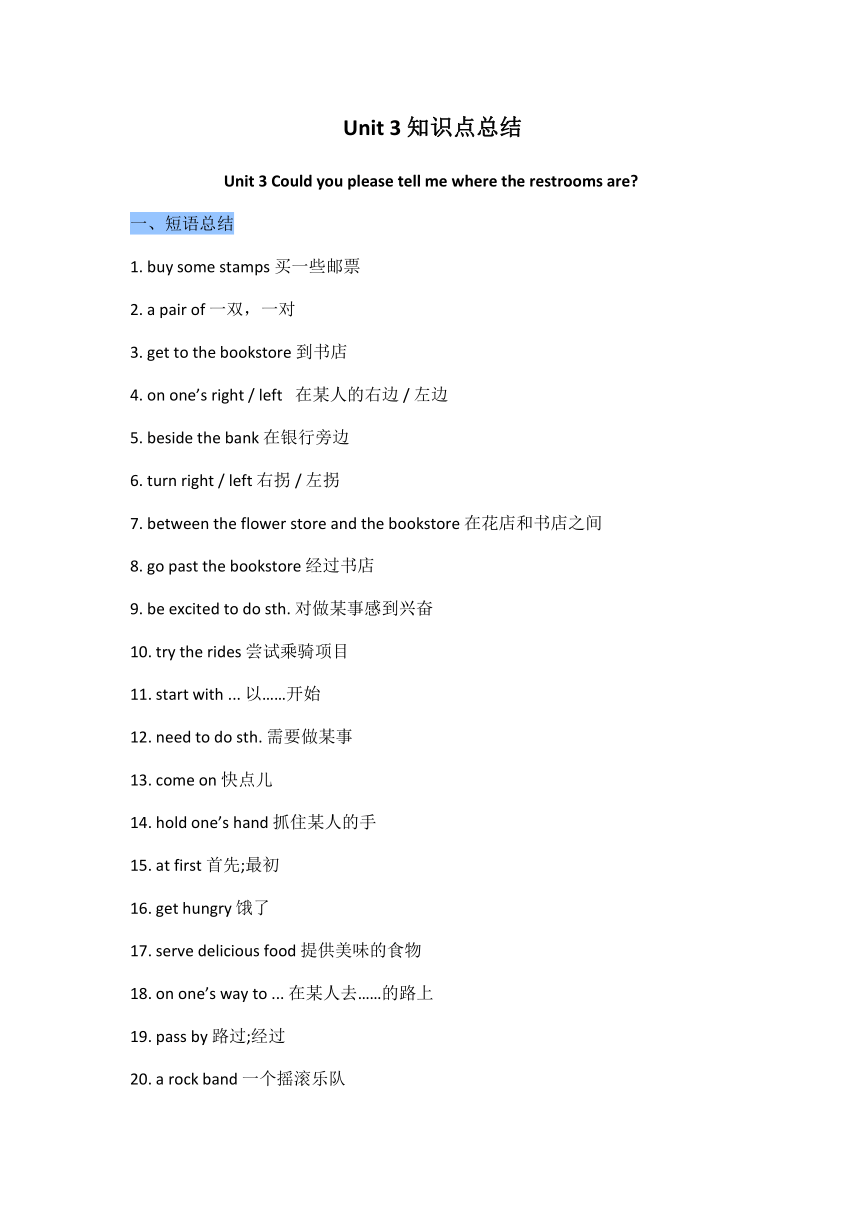
|
|
| 格式 | doc | ||
| 文件大小 | 365.5KB | ||
| 资源类型 | 教案 | ||
| 版本资源 | 人教新目标(Go for it)版 | ||
| 科目 | 英语 | ||
| 更新时间 | 2024-09-30 00:00:00 | ||
图片预览

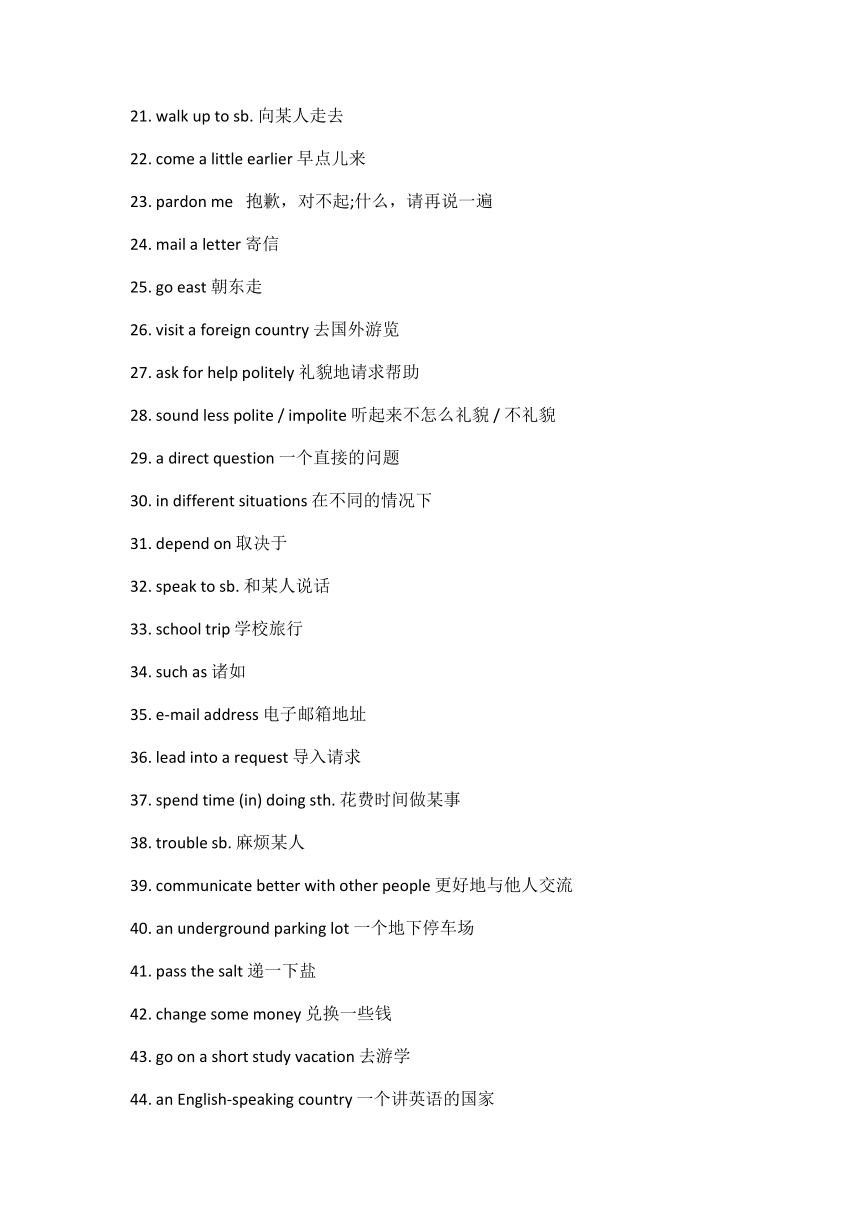
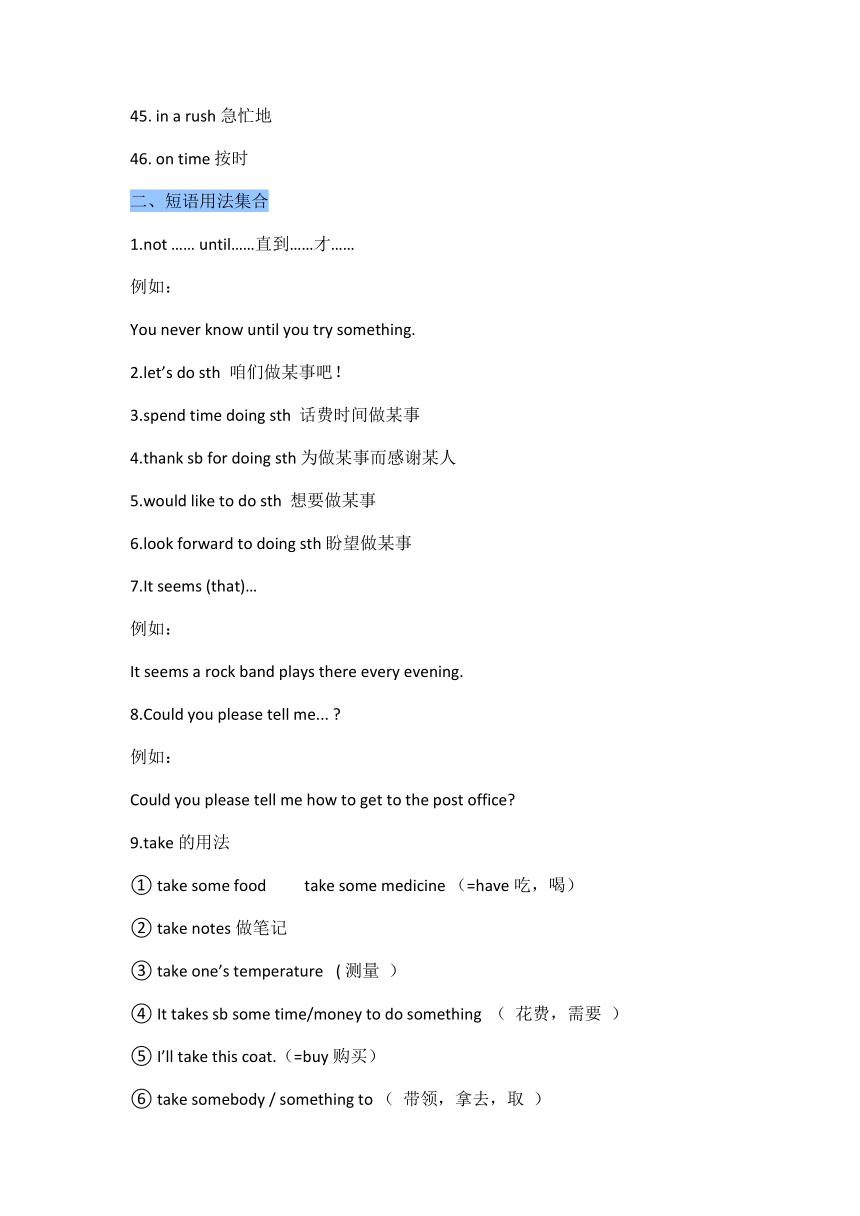
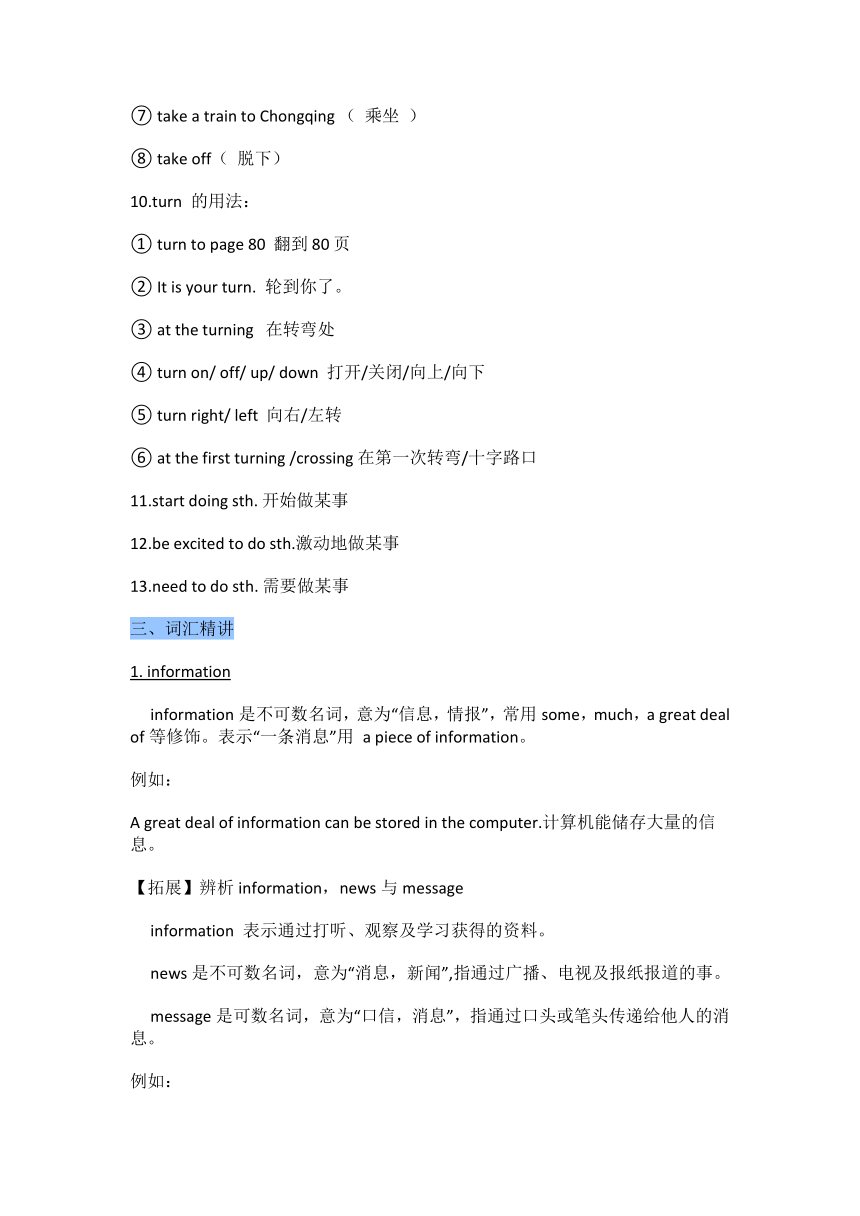
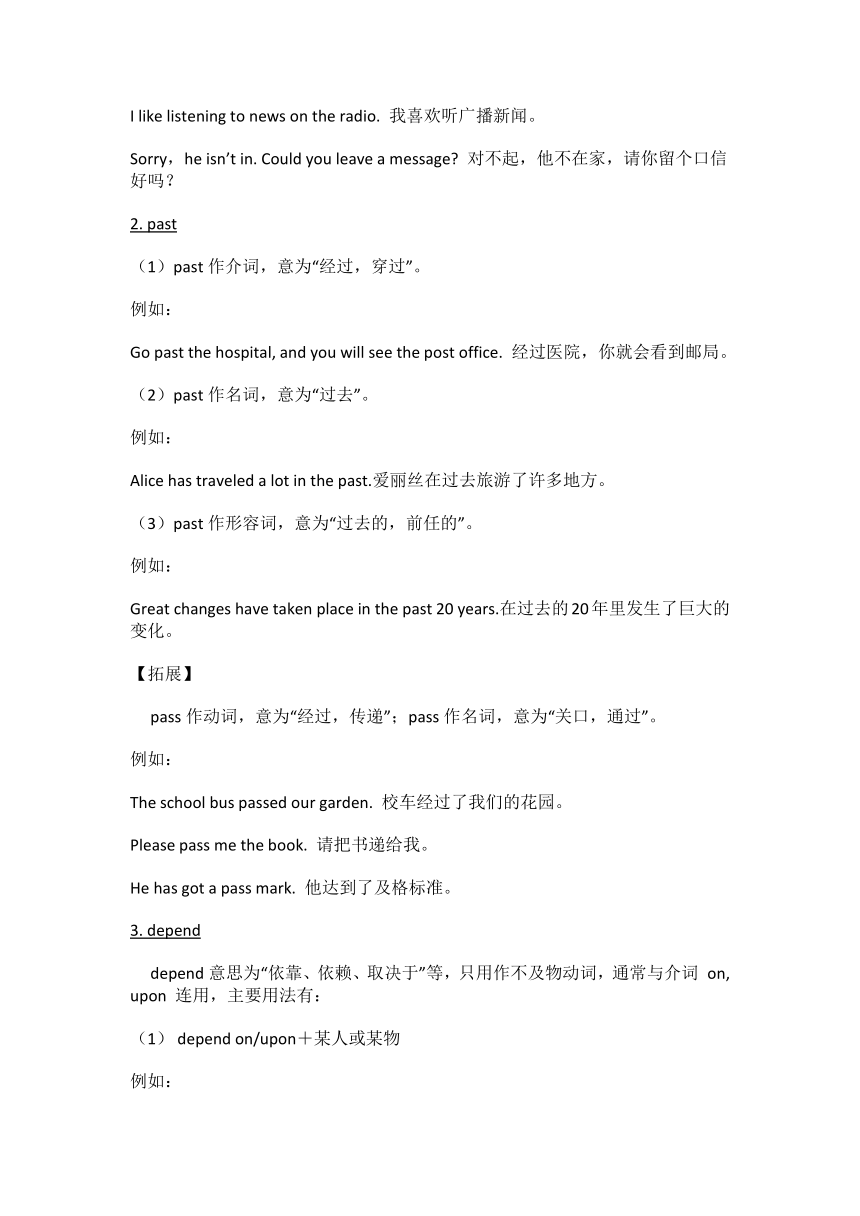
文档简介
Unit 3 知识点总结
Unit 3 Could you please tell me where the restrooms are
一、短语总结
1. buy some stamps 买一些邮票
2. a pair of 一双,一对
3. get to the bookstore 到书店
4. on one’s right / left 在某人的右边 / 左边
5. beside the bank 在银行旁边
6. turn right / left 右拐 / 左拐
7. between the flower store and the bookstore 在花店和书店之间
8. go past the bookstore 经过书店
9. be excited to do sth. 对做某事感到兴奋
10. try the rides 尝试乘骑项目
11. start with ... 以……开始
12. need to do sth. 需要做某事
e on 快点儿
14. hold one’s hand 抓住某人的手
15. at first 首先;最初
16. get hungry 饿了
17. serve delicious food 提供美味的食物
18. on one’s way to ... 在某人去……的路上
19. pass by 路过;经过
20. a rock band 一个摇滚乐队
21. walk up to sb. 向某人走去
22. come a little earlier 早点儿来
23. pardon me 抱歉,对不起;什么,请再说一遍
24. mail a letter 寄信
25. go east 朝东走
26. visit a foreign country 去国外游览
27. ask for help politely 礼貌地请求帮助
28. sound less polite / impolite 听起来不怎么礼貌 / 不礼貌
29. a direct question 一个直接的问题
30. in different situations 在不同的情况下
31. depend on 取决于
32. speak to sb. 和某人说话
33. school trip 学校旅行
34. such as 诸如
35. e-mail address 电子邮箱地址
36. lead into a request 导入请求
37. spend time (in) doing sth. 花费时间做某事
38. trouble sb. 麻烦某人
municate better with other people 更好地与他人交流
40. an underground parking lot 一个地下停车场
41. pass the salt 递一下盐
42. change some money 兑换一些钱
43. go on a short study vacation 去游学
44. an English-speaking country 一个讲英语的国家
45. in a rush 急忙地
46. on time 按时
二、短语用法集合
1.not …… until……直到……才……
例如:
You never know until you try something.
2.let’s do sth 咱们做某事吧!
3.spend time doing sth 话费时间做某事
4.thank sb for doing sth 为做某事而感谢某人
5.would like to do sth 想要做某事
6.look forward to doing sth 盼望做某事
7.It seems (that)…
例如:
It seems a rock band plays there every evening.
8.Could you please tell me...
例如:
Could you please tell me how to get to the post office
9.take的用法
① take some food take some medicine (=have吃,喝)
② take notes做笔记
③ take one’s temperature ( 测量 )
④ It takes sb some time/money to do something ( 花费,需要 )
⑤ I’ll take this coat.(=buy购买)
⑥ take somebody / something to ( 带领,拿去,取 )
⑦ take a train to Chongqing ( 乘坐 )
⑧ take off( 脱下)
10.turn 的用法:
① turn to page 80 翻到 80 页
② It is your turn. 轮到你了。
③ at the turning 在转弯处
④ turn on/ off/ up/ down 打开/关闭/向上/向下
⑤ turn right/ left 向右/左转
⑥ at the first turning /crossing 在第一次转弯/十字路口
11.start doing sth. 开始做某事
12.be excited to do sth.激动地做某事
13.need to do sth. 需要做某事
三、词汇精讲
1. information
information是不可数名词,意为“信息,情报”,常用some,much,a great deal of等修饰。表示“一条消息”用 a piece of information。
例如:
A great deal of information can be stored in the computer.计算机能储存大量的信息。
【拓展】辨析information,news与message
information 表示通过打听、观察及学习获得的资料。
news是不可数名词,意为“消息,新闻”,指通过广播、电视及报纸报道的事。
message是可数名词,意为“口信,消息”,指通过口头或笔头传递给他人的消息。
例如:
I like listening to news on the radio. 我喜欢听广播新闻。
Sorry,he isn’t in. Could you leave a message 对不起,他不在家,请你留个口信好吗?
2. past
(1)past作介词,意为“经过,穿过”。
例如:
Go past the hospital, and you will see the post office. 经过医院,你就会看到邮局。
(2)past作名词,意为“过去”。
例如:
Alice has traveled a lot in the past.爱丽丝在过去旅游了许多地方。
(3)past作形容词,意为“过去的,前任的”。
例如:
Great changes have taken place in the past 20 years.在过去的20年里发生了巨大的变化。
【拓展】
pass作动词,意为“经过,传递”;pass作名词,意为“关口,通过”。
例如:
The school bus passed our garden. 校车经过了我们的花园。
Please pass me the book. 请把书递给我。
He has got a pass mark. 他达到了及格标准。
3. depend
depend意思为“依靠、依赖、取决于”等,只用作不及物动词,通常与介词 on, upon 连用,主要用法有:
(1) depend on/upon+某人或某物
例如:
Whether we’ll go camping depends on the weather.我们是否去野营要看天气。
有时可在某人或某物后用介词for。
Children depend on their parents for food and clothing.儿童的衣食靠父母。。
(2)depend on [upon]+从句
例如:
Our success depends on whether everyone works hard or not.我们的成功取决于每个人是否努力。
The amount you pay depends on where you live.你付多少钱要看你住什么地方。
(3)口语中说 It (all) depends. /That depends.意为“那要看情况”。
例如:
—Are you going too 你也去吗
—That depends. 那要看情况。
4. correct
(1)correct作形容词,意为“正确的;合适的;恰当的”。
例如:
Do homework or read in a correct way.用正确的方法做作业或者读书。
The correct answers can be found at the bottom of page 8. 正确答案在第8页末尾。
I think English men are very polite and very correct. 我认为英国人很有礼貌,举止非常得体。
(2)correct 作动词意为“改正,校正,改错,批改”等。
例如:
It takes him a lot of time to correct the students’ homework.批改学生的作业花费他很多时间。
He may need surgery to correct the problem.他可能需要手术来矫正这一问题。
5. course
(1)course 作名词,意为“课程”,是可数名词,其复数为courses。
例如:
He flunked the course. 他考试不及格。
The college course was then cut to three years. 大学学制那时缩短到三年。
(2) course 作名词还可以意为“球场、一道菜、道路;线路”等。
例如:
There is an elaborate five-course meal.这儿有五道菜的美餐。
The ship has altered its course.这艘船改变了航线。
The country club has a golf course. 该地区俱乐部拥有高尔夫球场。
【拓展】course常用搭配有:
of course 自然,当然
in the course of discussion 在讨论期间
a matter of course 当然的事情
6. beside
beside作方位介词,以为“在……旁边”。
例如:
I moved from behind my desk to sit beside her. 我从桌子后面走到她身边坐了下来。
His room is beside mine. 他的房间紧挨着我的房间。
【拓展】
besides“除……之外(还有……)”指在整体中加入一部分,表示一种累加关系,有“加上”之意。
例如:
Besides milk, we need vegetables. 除了牛奶,我们还需要蔬菜。
Besides different types of gas, we can also use electricity (电) to run our cars.除了气体之外,电也可以用来发动汽车。
7. look forward to
look forward to 意思是“期待,盼望”,to是介词,后面接名词或者动名词。
例如:
I look forward to being alone in the house.我盼望能自己一人在这所房子。
We look forward to the return of spring. 我们期待着春天的到来。
【拓展】
虽然介词to与动词不定式符号to在形式上相同,但用法各异。主要区别归纳如下:
(1)介词to表示“向、往、对于 ” 等,既可以指时间、方向、距离、对象或结果,又可以指程度、直接或间接关系,后面必须接名词、代词等构成介词短语。
例如:
Japan is to the east ofChina. 日本在中国的东面。
Let’s drink to his health. 让我们为他的健康干杯。
He tied the monkey to the tree. 他把猴子拴在树上。
(2)动词不定式符号to无词义,后面必须接动词原形,构成不定式短语。
例如:
To play computer games is wrong. 玩电脑游戏是错误的。
My job is to teach English.我的工作是教英语。
I wish to go there. 我希望去那儿。
8. mean
(1)mean可以用作及物动词,意为“意欲,计划”。
例如:
I mean you to spend this money for your daughter.我是想让你用这笔款为你女儿买些东西的。
(2)mean还可以表示“预示”的意思。
例如:
This snow means no sport this afternoon. 这场雪使今天下午的体育活动搞不成了。
(3)mean还可以指“(字、句等)意指,意味”的意思。
例如:
A dictionary tells you what words mean. 词典告诉你词语的含义。
【拓展】辨析:mean to do, mean doing;
mean to do是“打算,企图”的意思。mean doing是表示“意味着”的意思。
例如:
I had meant to leave on Sunday. 我本打算周日走。
Missing the train means waiting for another hour.赶不上火车意味着要再等一个小时。
四、重点句子讲解
1. Could you please…
Could you please 后接动词原形,意为“请你……好吗?”是表示委婉且礼貌的请求,其否定形式是Could you please not 后接动词原形,意为“请你不要……好吗 ”。
例如:
Could you please help me clean the room 请你帮我打扫房间好吗?
Could you please not smoke here?请你不要在这抽烟好吗?
肯定回答:Sure./ Certainly./Of course./No problem./Yes, please.等
否定回答:Sorry,I can’t. I have to…/ I’d love to, but I have to...否定回答要礼貌地说明理由。
注意:
Could you…?句型的回答中,回答中不用could,用can。这里could不表示过去时态,只表示语气委婉。
【拓展】
表示客气礼貌的请求句型:
1) Would you please do sth 请你做某事好吗?
2) Would you like to do sth 你愿意做某事吗?
3) Would you mind doing sth 你介意做某事吗?
4) Shall I/we do sth 让我/我们做某事好吗?
5) Why not do sth 为什么不做某事呢?
2. I wonder if…
wonder作及物动词,意为“想知道;对……感到怀疑”,常见的用法有:
(1)后接who, what,why,where 等引导的宾语从句。
例如:
I wonder who she is. 我想知道她是谁。
She wondered what the child was doing. 她感到疑惑,孩子究竟在干什么。
I wonder why Ann is late. 我想知道安为什么迟到了。
I wonder where they have gone. 我想知道他们去哪儿了。
(2)后接 that 引导的宾语从句,表示“对……感到惊讶”, that常可省去。
例如:
I wonder (that) she has won the race. 我对她赢了比赛感到惊讶。
(3)后接 if 或 whether 引导的宾语从句,常用来表示一种委婉的请求或疑问。
例如:
She wondered whether you were free that morning.她想知道你那天上午是否有空。
I wonder if he will succeed.我不知道他会不会成功。
3. Sorry,I’m not sure.
I’m not sure. 意为“我不确定”。sure用作形容词,意为“肯定的,有把握的”,常与be动词连用。
(1)be sure to do sth.意为“务必做某事”,表示要求,多用于祈使句;有时还可表示一种推断“肯定做某事”。
例如:
Be sure to telephone me and give me all the news.请一定要给我打电话,让我知道所有的消息。
The child is sure to be a teacher. 这孩子一定会成为一名教师。
(2) be sure of / about (doing) sth. 表示人对某事(物)的看法,意为“对……有把握”。其后常接名词、代词或动词-ing形式。
例如:
Are you sure of passing the exam 你有把握通过考试吗?
I'm not sure about English grammar. 我对英语语法没有把握。
(3)sure用作副词,意为“当然,的确”。常用来回答一般疑问句,相当于yes或certainly。
例如:
—Are you going with us 你和我们一起去吗?
—Sure. 当然啦。
4. You don’t need to rush!
need作实义动词,意为“需要”。常用搭配为need sth.或 need to do sth.
例如:
I need some help. 我需要一些帮助。
You need to see a doctor. 你需要去看医生。
He needs to take a bus. 他需要去搭车。
need作情态动词,意为“需要”,后接动词原形。
例如:
If she wants anything, she only need ask.她想要什么东西, 只要开口就行了。
You needn’t finish this work today.你不必今天完成这项工作。
5. We even need to spend time leading in to a request.
spend是动词,意为“花费(时间或金钱)”。其过去式为spent。用法如下:
spend + 时间/金钱 + (in) doing sth. 花费时间或金钱做某事
spend + 时间/金钱 + on sth. 花费时间或金钱在某物上
例如:
I spend two hours in reading every day. 我每天花两个小时阅读。
He spends 20 yuan on books every month. 他每月花20元买书。
【拓展】表示“花费”的spend、take、cost和pay的辨析:
例如:
I spent 3 hours (in) doing /on my homework yesterday. 昨天我花了三个小时做作业。
It took me four hours to go to Wuhan by bus. 乘公共汽车去武汉花了我四个小时。
I paid six yuan for the pen. 我花了六元钱买这支笔。
My English book cost me five yuan. 我的英语书花了我五元钱。
五、语法讲解
1.宾语从句
(1)宾语从句的连接词
特殊疑问词作连接词:
特殊疑问句的疑问词通常有疑问代词what, which , who , whose和疑问副词Where , when , why , how等。
例如:
He wondered what had happened to her. 他想知道她到底发生了什么事?
Could you tell me how I can get to the hospital 可以告诉我去医院怎么走吗?
(2)宾语从句的语序
在含有宾语从句的复合句中,不管主句是陈述句还是疑问句,从句一律用陈述语序,即“连接词+ 陈述句语序”,其标点由主句来决定。
例如:
Where does Mr. Liu live Do you know 转换为:Do you know where Mr. Liu lives
What were you doing at that time I want to know.转换为:I want to know what you were doing at that time .
(3)宾语从句的时态
1) 如果主句用一般现在时,宾语从句的时态根据句意使用任何时态。
2) 如果主句用过去时态,宾语从句必须使用过去的相应的某一时态。
3) 如果宾语从句表示的是客观事实、普遍真理、自然现象、名言等,不管主句是什么时态,从句都要用一般现在时。
例如:
Mary thinks (that) movie was just fantastic.玛丽认为那部电影太精彩了。
Linda asked what she would do the next day. 琳达问她明天做什么。
My head teacher told me failure is the mother of success.我的班主任告诉过我失败是成功之母。
(4) 温馨提示
1)宾语从句在一定条件下,可以用“疑问词 + 不定式”来代替。
2)当宾语从句表示否定意义的时候,并且主句谓语动词为think / believe / suppose / expect等,应遵循“否定前移”的语法原则,也即对主句进行否定。
3) 含how的词组也可以引导宾语从句。主要有how old, how many, how much, how long, how often, how far等。
例如:
I don't expect he will win the match. 我认为他不会赢得比赛的。
I don't know how much the book costs. 我不知道这本书花费了多少钱。
2. 问路与指路句型
(1)问路的常用句型:
① How can I get to … 我怎么能到达……?
② Which is the way to … 哪条是去……路?
③ Could you tell me the way to … 你能告诉我去……路吗?
④ Could you tell me how to get to … 你能告诉我怎么去…… ?
例如:
Excuse me. Could you tell me how I can get to the bookshop
Excuse me. Which is the way to the bookshop
Excuse me. Could you tell me the way to the bookshop
Excuse me. Could you tell me how to get to the bookshop
以上句子都可以译为:打扰了。请问去书店怎么走?
(2)为别人指路的常用句型:
① go / walk along this road / street 沿着这条路/街走。
② take the first/second road on the left/right 走左/右边的第一条/第二条路。
③ take the first turning the left/right 在第一个转弯处左/右拐。
④ turn left at the first crossing. 在第一个十字路口左转
⑤ it’s about … meters from here . 大约离这儿有……米
六、作文积累
1. 本单元的话题是“如何指路”。
写作此类话题作文的常用表达有:
(1) Let me tall you how to get there.
(2) You can walk along...
(3) Turn left/right to...
(4) Go straight along...
2. 典型例题
你有两张红旗剧院的戏剧票,想要邀请Rob和你一起去看。请你给他写封信,邀请他并告诉他具体该怎么到达红旗剧院。
【优秀作文】
Dear Rob,
Are you free next Sunday There will be a concert in Hongqi Theater. I have two tickets and I hope you can go with me. Now let me tall you how to get there.First , you can walk along Zhaowuda Road after you leave your home. Then turn left onto Third Street. Go straight along Third Street. When you get to Walking Street,turn right. Then go along the street until you see Hongqi Theater on your right. I will meet you at the gate of Hongqi Theater.
Yours,
Liu Ming
Unit 3 Could you please tell me where the restrooms are
一、短语总结
1. buy some stamps 买一些邮票
2. a pair of 一双,一对
3. get to the bookstore 到书店
4. on one’s right / left 在某人的右边 / 左边
5. beside the bank 在银行旁边
6. turn right / left 右拐 / 左拐
7. between the flower store and the bookstore 在花店和书店之间
8. go past the bookstore 经过书店
9. be excited to do sth. 对做某事感到兴奋
10. try the rides 尝试乘骑项目
11. start with ... 以……开始
12. need to do sth. 需要做某事
e on 快点儿
14. hold one’s hand 抓住某人的手
15. at first 首先;最初
16. get hungry 饿了
17. serve delicious food 提供美味的食物
18. on one’s way to ... 在某人去……的路上
19. pass by 路过;经过
20. a rock band 一个摇滚乐队
21. walk up to sb. 向某人走去
22. come a little earlier 早点儿来
23. pardon me 抱歉,对不起;什么,请再说一遍
24. mail a letter 寄信
25. go east 朝东走
26. visit a foreign country 去国外游览
27. ask for help politely 礼貌地请求帮助
28. sound less polite / impolite 听起来不怎么礼貌 / 不礼貌
29. a direct question 一个直接的问题
30. in different situations 在不同的情况下
31. depend on 取决于
32. speak to sb. 和某人说话
33. school trip 学校旅行
34. such as 诸如
35. e-mail address 电子邮箱地址
36. lead into a request 导入请求
37. spend time (in) doing sth. 花费时间做某事
38. trouble sb. 麻烦某人
municate better with other people 更好地与他人交流
40. an underground parking lot 一个地下停车场
41. pass the salt 递一下盐
42. change some money 兑换一些钱
43. go on a short study vacation 去游学
44. an English-speaking country 一个讲英语的国家
45. in a rush 急忙地
46. on time 按时
二、短语用法集合
1.not …… until……直到……才……
例如:
You never know until you try something.
2.let’s do sth 咱们做某事吧!
3.spend time doing sth 话费时间做某事
4.thank sb for doing sth 为做某事而感谢某人
5.would like to do sth 想要做某事
6.look forward to doing sth 盼望做某事
7.It seems (that)…
例如:
It seems a rock band plays there every evening.
8.Could you please tell me...
例如:
Could you please tell me how to get to the post office
9.take的用法
① take some food take some medicine (=have吃,喝)
② take notes做笔记
③ take one’s temperature ( 测量 )
④ It takes sb some time/money to do something ( 花费,需要 )
⑤ I’ll take this coat.(=buy购买)
⑥ take somebody / something to ( 带领,拿去,取 )
⑦ take a train to Chongqing ( 乘坐 )
⑧ take off( 脱下)
10.turn 的用法:
① turn to page 80 翻到 80 页
② It is your turn. 轮到你了。
③ at the turning 在转弯处
④ turn on/ off/ up/ down 打开/关闭/向上/向下
⑤ turn right/ left 向右/左转
⑥ at the first turning /crossing 在第一次转弯/十字路口
11.start doing sth. 开始做某事
12.be excited to do sth.激动地做某事
13.need to do sth. 需要做某事
三、词汇精讲
1. information
information是不可数名词,意为“信息,情报”,常用some,much,a great deal of等修饰。表示“一条消息”用 a piece of information。
例如:
A great deal of information can be stored in the computer.计算机能储存大量的信息。
【拓展】辨析information,news与message
information 表示通过打听、观察及学习获得的资料。
news是不可数名词,意为“消息,新闻”,指通过广播、电视及报纸报道的事。
message是可数名词,意为“口信,消息”,指通过口头或笔头传递给他人的消息。
例如:
I like listening to news on the radio. 我喜欢听广播新闻。
Sorry,he isn’t in. Could you leave a message 对不起,他不在家,请你留个口信好吗?
2. past
(1)past作介词,意为“经过,穿过”。
例如:
Go past the hospital, and you will see the post office. 经过医院,你就会看到邮局。
(2)past作名词,意为“过去”。
例如:
Alice has traveled a lot in the past.爱丽丝在过去旅游了许多地方。
(3)past作形容词,意为“过去的,前任的”。
例如:
Great changes have taken place in the past 20 years.在过去的20年里发生了巨大的变化。
【拓展】
pass作动词,意为“经过,传递”;pass作名词,意为“关口,通过”。
例如:
The school bus passed our garden. 校车经过了我们的花园。
Please pass me the book. 请把书递给我。
He has got a pass mark. 他达到了及格标准。
3. depend
depend意思为“依靠、依赖、取决于”等,只用作不及物动词,通常与介词 on, upon 连用,主要用法有:
(1) depend on/upon+某人或某物
例如:
Whether we’ll go camping depends on the weather.我们是否去野营要看天气。
有时可在某人或某物后用介词for。
Children depend on their parents for food and clothing.儿童的衣食靠父母。。
(2)depend on [upon]+从句
例如:
Our success depends on whether everyone works hard or not.我们的成功取决于每个人是否努力。
The amount you pay depends on where you live.你付多少钱要看你住什么地方。
(3)口语中说 It (all) depends. /That depends.意为“那要看情况”。
例如:
—Are you going too 你也去吗
—That depends. 那要看情况。
4. correct
(1)correct作形容词,意为“正确的;合适的;恰当的”。
例如:
Do homework or read in a correct way.用正确的方法做作业或者读书。
The correct answers can be found at the bottom of page 8. 正确答案在第8页末尾。
I think English men are very polite and very correct. 我认为英国人很有礼貌,举止非常得体。
(2)correct 作动词意为“改正,校正,改错,批改”等。
例如:
It takes him a lot of time to correct the students’ homework.批改学生的作业花费他很多时间。
He may need surgery to correct the problem.他可能需要手术来矫正这一问题。
5. course
(1)course 作名词,意为“课程”,是可数名词,其复数为courses。
例如:
He flunked the course. 他考试不及格。
The college course was then cut to three years. 大学学制那时缩短到三年。
(2) course 作名词还可以意为“球场、一道菜、道路;线路”等。
例如:
There is an elaborate five-course meal.这儿有五道菜的美餐。
The ship has altered its course.这艘船改变了航线。
The country club has a golf course. 该地区俱乐部拥有高尔夫球场。
【拓展】course常用搭配有:
of course 自然,当然
in the course of discussion 在讨论期间
a matter of course 当然的事情
6. beside
beside作方位介词,以为“在……旁边”。
例如:
I moved from behind my desk to sit beside her. 我从桌子后面走到她身边坐了下来。
His room is beside mine. 他的房间紧挨着我的房间。
【拓展】
besides“除……之外(还有……)”指在整体中加入一部分,表示一种累加关系,有“加上”之意。
例如:
Besides milk, we need vegetables. 除了牛奶,我们还需要蔬菜。
Besides different types of gas, we can also use electricity (电) to run our cars.除了气体之外,电也可以用来发动汽车。
7. look forward to
look forward to 意思是“期待,盼望”,to是介词,后面接名词或者动名词。
例如:
I look forward to being alone in the house.我盼望能自己一人在这所房子。
We look forward to the return of spring. 我们期待着春天的到来。
【拓展】
虽然介词to与动词不定式符号to在形式上相同,但用法各异。主要区别归纳如下:
(1)介词to表示“向、往、对于 ” 等,既可以指时间、方向、距离、对象或结果,又可以指程度、直接或间接关系,后面必须接名词、代词等构成介词短语。
例如:
Japan is to the east ofChina. 日本在中国的东面。
Let’s drink to his health. 让我们为他的健康干杯。
He tied the monkey to the tree. 他把猴子拴在树上。
(2)动词不定式符号to无词义,后面必须接动词原形,构成不定式短语。
例如:
To play computer games is wrong. 玩电脑游戏是错误的。
My job is to teach English.我的工作是教英语。
I wish to go there. 我希望去那儿。
8. mean
(1)mean可以用作及物动词,意为“意欲,计划”。
例如:
I mean you to spend this money for your daughter.我是想让你用这笔款为你女儿买些东西的。
(2)mean还可以表示“预示”的意思。
例如:
This snow means no sport this afternoon. 这场雪使今天下午的体育活动搞不成了。
(3)mean还可以指“(字、句等)意指,意味”的意思。
例如:
A dictionary tells you what words mean. 词典告诉你词语的含义。
【拓展】辨析:mean to do, mean doing;
mean to do是“打算,企图”的意思。mean doing是表示“意味着”的意思。
例如:
I had meant to leave on Sunday. 我本打算周日走。
Missing the train means waiting for another hour.赶不上火车意味着要再等一个小时。
四、重点句子讲解
1. Could you please…
Could you please 后接动词原形,意为“请你……好吗?”是表示委婉且礼貌的请求,其否定形式是Could you please not 后接动词原形,意为“请你不要……好吗 ”。
例如:
Could you please help me clean the room 请你帮我打扫房间好吗?
Could you please not smoke here?请你不要在这抽烟好吗?
肯定回答:Sure./ Certainly./Of course./No problem./Yes, please.等
否定回答:Sorry,I can’t. I have to…/ I’d love to, but I have to...否定回答要礼貌地说明理由。
注意:
Could you…?句型的回答中,回答中不用could,用can。这里could不表示过去时态,只表示语气委婉。
【拓展】
表示客气礼貌的请求句型:
1) Would you please do sth 请你做某事好吗?
2) Would you like to do sth 你愿意做某事吗?
3) Would you mind doing sth 你介意做某事吗?
4) Shall I/we do sth 让我/我们做某事好吗?
5) Why not do sth 为什么不做某事呢?
2. I wonder if…
wonder作及物动词,意为“想知道;对……感到怀疑”,常见的用法有:
(1)后接who, what,why,where 等引导的宾语从句。
例如:
I wonder who she is. 我想知道她是谁。
She wondered what the child was doing. 她感到疑惑,孩子究竟在干什么。
I wonder why Ann is late. 我想知道安为什么迟到了。
I wonder where they have gone. 我想知道他们去哪儿了。
(2)后接 that 引导的宾语从句,表示“对……感到惊讶”, that常可省去。
例如:
I wonder (that) she has won the race. 我对她赢了比赛感到惊讶。
(3)后接 if 或 whether 引导的宾语从句,常用来表示一种委婉的请求或疑问。
例如:
She wondered whether you were free that morning.她想知道你那天上午是否有空。
I wonder if he will succeed.我不知道他会不会成功。
3. Sorry,I’m not sure.
I’m not sure. 意为“我不确定”。sure用作形容词,意为“肯定的,有把握的”,常与be动词连用。
(1)be sure to do sth.意为“务必做某事”,表示要求,多用于祈使句;有时还可表示一种推断“肯定做某事”。
例如:
Be sure to telephone me and give me all the news.请一定要给我打电话,让我知道所有的消息。
The child is sure to be a teacher. 这孩子一定会成为一名教师。
(2) be sure of / about (doing) sth. 表示人对某事(物)的看法,意为“对……有把握”。其后常接名词、代词或动词-ing形式。
例如:
Are you sure of passing the exam 你有把握通过考试吗?
I'm not sure about English grammar. 我对英语语法没有把握。
(3)sure用作副词,意为“当然,的确”。常用来回答一般疑问句,相当于yes或certainly。
例如:
—Are you going with us 你和我们一起去吗?
—Sure. 当然啦。
4. You don’t need to rush!
need作实义动词,意为“需要”。常用搭配为need sth.或 need to do sth.
例如:
I need some help. 我需要一些帮助。
You need to see a doctor. 你需要去看医生。
He needs to take a bus. 他需要去搭车。
need作情态动词,意为“需要”,后接动词原形。
例如:
If she wants anything, she only need ask.她想要什么东西, 只要开口就行了。
You needn’t finish this work today.你不必今天完成这项工作。
5. We even need to spend time leading in to a request.
spend是动词,意为“花费(时间或金钱)”。其过去式为spent。用法如下:
spend + 时间/金钱 + (in) doing sth. 花费时间或金钱做某事
spend + 时间/金钱 + on sth. 花费时间或金钱在某物上
例如:
I spend two hours in reading every day. 我每天花两个小时阅读。
He spends 20 yuan on books every month. 他每月花20元买书。
【拓展】表示“花费”的spend、take、cost和pay的辨析:
例如:
I spent 3 hours (in) doing /on my homework yesterday. 昨天我花了三个小时做作业。
It took me four hours to go to Wuhan by bus. 乘公共汽车去武汉花了我四个小时。
I paid six yuan for the pen. 我花了六元钱买这支笔。
My English book cost me five yuan. 我的英语书花了我五元钱。
五、语法讲解
1.宾语从句
(1)宾语从句的连接词
特殊疑问词作连接词:
特殊疑问句的疑问词通常有疑问代词what, which , who , whose和疑问副词Where , when , why , how等。
例如:
He wondered what had happened to her. 他想知道她到底发生了什么事?
Could you tell me how I can get to the hospital 可以告诉我去医院怎么走吗?
(2)宾语从句的语序
在含有宾语从句的复合句中,不管主句是陈述句还是疑问句,从句一律用陈述语序,即“连接词+ 陈述句语序”,其标点由主句来决定。
例如:
Where does Mr. Liu live Do you know 转换为:Do you know where Mr. Liu lives
What were you doing at that time I want to know.转换为:I want to know what you were doing at that time .
(3)宾语从句的时态
1) 如果主句用一般现在时,宾语从句的时态根据句意使用任何时态。
2) 如果主句用过去时态,宾语从句必须使用过去的相应的某一时态。
3) 如果宾语从句表示的是客观事实、普遍真理、自然现象、名言等,不管主句是什么时态,从句都要用一般现在时。
例如:
Mary thinks (that) movie was just fantastic.玛丽认为那部电影太精彩了。
Linda asked what she would do the next day. 琳达问她明天做什么。
My head teacher told me failure is the mother of success.我的班主任告诉过我失败是成功之母。
(4) 温馨提示
1)宾语从句在一定条件下,可以用“疑问词 + 不定式”来代替。
2)当宾语从句表示否定意义的时候,并且主句谓语动词为think / believe / suppose / expect等,应遵循“否定前移”的语法原则,也即对主句进行否定。
3) 含how的词组也可以引导宾语从句。主要有how old, how many, how much, how long, how often, how far等。
例如:
I don't expect he will win the match. 我认为他不会赢得比赛的。
I don't know how much the book costs. 我不知道这本书花费了多少钱。
2. 问路与指路句型
(1)问路的常用句型:
① How can I get to … 我怎么能到达……?
② Which is the way to … 哪条是去……路?
③ Could you tell me the way to … 你能告诉我去……路吗?
④ Could you tell me how to get to … 你能告诉我怎么去…… ?
例如:
Excuse me. Could you tell me how I can get to the bookshop
Excuse me. Which is the way to the bookshop
Excuse me. Could you tell me the way to the bookshop
Excuse me. Could you tell me how to get to the bookshop
以上句子都可以译为:打扰了。请问去书店怎么走?
(2)为别人指路的常用句型:
① go / walk along this road / street 沿着这条路/街走。
② take the first/second road on the left/right 走左/右边的第一条/第二条路。
③ take the first turning the left/right 在第一个转弯处左/右拐。
④ turn left at the first crossing. 在第一个十字路口左转
⑤ it’s about … meters from here . 大约离这儿有……米
六、作文积累
1. 本单元的话题是“如何指路”。
写作此类话题作文的常用表达有:
(1) Let me tall you how to get there.
(2) You can walk along...
(3) Turn left/right to...
(4) Go straight along...
2. 典型例题
你有两张红旗剧院的戏剧票,想要邀请Rob和你一起去看。请你给他写封信,邀请他并告诉他具体该怎么到达红旗剧院。
【优秀作文】
Dear Rob,
Are you free next Sunday There will be a concert in Hongqi Theater. I have two tickets and I hope you can go with me. Now let me tall you how to get there.First , you can walk along Zhaowuda Road after you leave your home. Then turn left onto Third Street. Go straight along Third Street. When you get to Walking Street,turn right. Then go along the street until you see Hongqi Theater on your right. I will meet you at the gate of Hongqi Theater.
Yours,
Liu Ming
同课章节目录
- Unit 1 How can we become good learners.
- Section A
- Section B
- Unit 2 I think that mooncakes are delicious!
- Section A
- Section B
- Unit 3 Could you please tell me where the restroom
- Section A
- Section B
- Unit 4 I used to be afraid of the dark.
- Section A
- Section B
- Unit 5 What are the shirts made of?
- Section A
- Section B
- Review of Units 1-5
- Unit 6 When was it invented?
- Section A
- Section B
- Unit 7 Teenagers should be allowed to choose their
- Section A
- Section B
- Unit 8 It must belong to Carla.
- Section A
- Section B
- Unit 9 I like music that I can dance to.
- Section A
- Section B
- Unit 10 You're supposed to shake hands.
- Section A
- Section B
- Review of Units 6-10
- Unit 11 Sad movies make me cry.
- Section A
- Section B
- Unit 12 Life is full of the unexpected
- Section A
- Section B
- Unit 13 We're trying to save the earth!
- Section A
- Section B
- Unit 14 I remember meeting all of you in Grade 7.
- Section A
- Section B
- Review of Units 11-14
